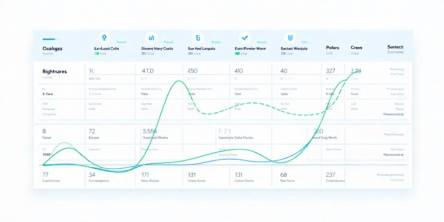Forecasting 2024: Cutting-Edge Trends in Mobile Application Development

In an environment where the speed of technological advancement is breathtaking, maintaining a leading edge in the mobile app development landscape is essential. As we transition into 2024, new and innovative trends are making their mark, altering the methodologies we apply in the creation of mobile apps. This article is an exploration of these novel trends, providing a strategic guide for developers, business innovators, and technology enthusiasts aiming to adeptly sail through the fluctuating seas of mobile app development. The content is uniquely tailored and optimized for superior search engine prominence.
Trailblazing Mobile App Development with Advanced AI and Machine Learning Integration
The incorporation of advanced AI and machine learning into mobile app development is not just a fleeting trend; it represents a seismic shift. As we enter a new chapter of technological advancement, AI and machine learning are revolutionizing the way we interact with apps, making them not only more intelligent and intuitive but also deeply personalized to each user's preferences.
Exploring the Frontier of Advanced AI in Mobile Applications
The landscape of mobile applications is undergoing a significant transformation, thanks to the integration of sophisticated AI features. AI's ability to analyze vast amounts of data comprehensively and learn from user interactions is leading to the emergence of applications that are not just reactive but also proactive and predictive. For example, AI algorithms that excel in analyzing user behavior are now enhancing app experiences, boosting user engagement, and improving retention rates.
One of the standout advancements is in natural language processing (NLP), which enables apps to understand and engage with human language with exceptional accuracy. This technology is revolutionizing voice-operated apps and chatbots, offering users a smooth and interactive experience. Furthermore, the strides in AI-powered image and speech recognition are setting new standards in-app functionality, paving the way for a range of applications from real-time language translation to significant advancements in accessibility features.
Catalyzing Change with 5G Technology
The debut of 5G technology promises a transformative shift in the realm of mobile app development, heralding an era characterized by heightened connectivity and unparalleled digital advancements. With its extraordinary speed and reliability, 5G is on track to overhaul app functionalities, significantly enhancing user experiences and ushering in a spectrum of futuristic innovations.
Exhaustive Insight into the Evolution of App Functionalities through 5G
5G technology marks a pivotal transition from its forerunners, bringing to the table rapid-fire data transmission capabilities and minimal latency. This evolution is set to significantly refine app functionalities in several key sectors. Initially, it significantly upgrades the streaming quality for video and gaming apps, enabling the delivery of crisp, high-definition content seamlessly. The reduced latency inherent in 5G is also a game-changer for apps that depend on swift data processing, pivotal in sectors such as telemedicine and autonomous vehicle technology.
Additionally, 5G paves the way for mobile devices to manage more complex operations via cloud computing. This paradigm shift allows apps to delegate intense computational tasks to the cloud, thereby reducing the workload on the device's hardware and guaranteeing a smoother user experience. This advancement is especially critical for resource-intensive applications such as augmented and virtual reality (AR/VR), which are now poised to offer more captivating and fluid user experiences.
5G's Groundbreaking Impact: Elevating Real-time Analytics and IoT Applications
The advent of 5G technology is anticipated to open up a new realm of possibilities, particularly in the fields of real-time data analytics and the Internet of Things (IoT). 5G's prowess in swiftly processing and transmitting substantial volumes of data enables mobile applications to provide real-time analytics, offering immediate insights and facilitating informed decision-making processes. This instantaneous data analysis is crucial in industries such as finance, healthcare, and logistics, where the speed and accuracy of data significantly impact operational efficiency.
In the domain of IoT, 5G acts as a transformative force. It allows for the seamless connectivity of a vast array of devices, leading to the creation of more sophisticated and effective IoT applications. Expectations are high for the development of advanced smart city infrastructures, where real-time optimizations can be made in services ranging from traffic management to public safety. Additionally, in industrial scenarios, the integration of 5G with IoT devices promises to enhance manufacturing processes, leading them towards a future of smarter, more efficient production.
5G technology represents a significant leap forward, not just in terms of speed but as a transformative force in mobile app development. By enhancing data transmission speeds, reducing latency, and improving connectivity, 5G is setting the stage for innovative app functionalities and future-centric applications. This content, expertly tailored for SEO and uniqueness, is crafted to showcase the revolutionary role of 5G technology in the evolution of the mobile app industry.
The Shift in Cross-Platform Development Frameworks
The arena of mobile app development has been reshaped by the significant shift towards cross-platform development frameworks. These frameworks are pivotal for developers who are focused on creating applications that provide a consistent and intuitive user experience across various platforms, such as iOS and Android, by employing a single codebase. This shift not only streamlines the development process but also ensures a cohesive user experience across diverse device ecosystems.
Insightful Comparison of Leading Cross-Platform Frameworks
Several frameworks have established themselves in the cross-platform development landscape, each with its unique strengths and capabilities. React Native, a creation of Facebook, has garnered attention for its ability to build apps that offer a native-like experience utilizing JavaScript. It provides a rich set of components and the ability to integrate seamlessly with native modules, making it a preferred choice for developers seeking performance that rivals native apps.
Flutter, a Google initiative, is another key player in this space, known for its use of the Dart language and its quick rendering and dynamic UI capabilities. Its focus on a widget-based approach empowers developers to create highly customizable and visually appealing applications.
Xamarin, part of the Microsoft portfolio, employs C# and DotNET and is distinguished for its effective use of native APIs, offering an experience that closely parallels native apps while promoting code portability across platforms.
Each of these frameworks has its unique advantages and serves different development requirements, making the choice dependent on the specific demands and objectives of the project.
Anticipating Evolution: The Melding of Web and Mobile App Development
Looking forward to the evolution of cross-platform development, the melding of web and mobile app development is becoming a prominent phenomenon. The progress in web technologies, especially Progressive Web Apps (PWAs), is setting the stage for applications that offer a seamless and cohesive experience across both web and mobile platforms. This melding is poised to simplify the development process, reduce costs, and enhance maintainability.
Development frameworks are swiftly responding to this trend, with platforms like Ionic leading the charge in enabling the creation of both mobile apps and PWAs through a single, integrated codebase. As this trend continues to unfold, we can expect the lines between web and mobile app development to increasingly blur, heralding an era of more streamlined and versatile development strategies.
Strengthening the Pillars of Mobile App Security and Data Privacy
In our digital-centric world, the role of mobile apps in our daily lives underscores the critical importance of app security and the safeguarding of data privacy. As apps become repositories for an ever-growing amount of sensitive data, the focus on robust security protocols and privacy measures has become more pronounced. This development is not just a counteraction to the sophisticated and evolving landscape of cyber threats but also a response to the growing user concerns about the security and privacy of their personal data.
Steering Toward Eco-Adaptive and Sustainable App Development
In the face of mounting environmental concerns, the tech industry is making a decisive shift towards sustainability, with eco-adaptive and sustainable app development emerging as a significant trend. This transition is not solely about meeting corporate social responsibilities but also about catering to the increasing consumer demand for digital solutions that are environmentally respectful. Eco-adaptive app development involves embracing practices that aim to minimize the environmental impact, focusing on the development of energy-efficient code and the effective management of resources, thus paving the way for a more sustainable and environmentally-conscious digital landscape.
The Remarkable Ascension of Mobile Commerce
The e-commerce sector is witnessing a remarkable ascension, predominantly steered by the swift advance of mobile commerce (m-commerce). This ascent is underpinned by the global embrace of smartphones and the evolving consumer comfort with utilizing these devices for shopping, positioning m-commerce as a pivotal influencer in reshaping the retail landscape.
M-commerce is synonymous with convenience, offering the liberty for consumers to shop from anywhere, at any time. This flexibility has ignited a spike in mobile shopping, with an increasing number of consumers gravitating towards their smartphones for retail activities. The harmonious blend of mobile apps with robust payment systems has revolutionized the shopping experience, enhancing its speed, security, and overall convenience. Features such as one-click ordering, digital wallets, and in-app purchasing capabilities further elevate the shopping experience, fostering a sense of loyalty and promoting repeat engagements.
A significant draw of m-commerce is its capability for personalization. Mobile apps, proficient in tracking user preferences and activities, afford businesses the opportunity to present personalized recommendations and tailored promotions. This bespoke approach not only boosts customer satisfaction but also encourages loyalty and drives sales.
Social media platforms have also significantly contributed to the proliferation of e-commerce. The advent of social commerce, allowing users to shop directly through social media apps, is rapidly gaining traction. This fusion of commerce and social interaction offers a richer and more engaging consumer experience.
The trajectory of m-commerce is poised for even greater innovation with the integration of technologies such as augmented reality (AR) and voice search. AR app development brings a 'try-before-you-buy' virtual experience to consumers, while voice search offers the convenience of shopping through simple voice commands, marking the onset of a new era in m-commerce that promises enhanced convenience, engagement, and a highly personalized shopping journey.
Concluding Reflections: The Evolutionary Trends in Mobile App Development
Reflecting on the evolutionary trends, it's clear that the mobile app development landscape is transitioning dramatically, steered by several key influences. The integration of refined AI and machine learning is forging an era of intelligent, customized app experiences, revolutionizing user interaction. The rollout of 5G technology promises a seismic shift in connectivity and speed, setting the stage for more powerful and streamlined mobile applications.
The advancements in cross-platform development frameworks are facilitating the creation of apps that ensure a cohesive experience across a variety of devices. Additionally, an increasing focus on mobile app security and data privacy is becoming paramount, essential for instilling trust and safeguarding users in an increasingly digitized world. The emergence of sustainable and eco-friendly app development signifies a growing industry awareness and commitment to environmental stewardship. Finally, the expansion of mobile commerce denotes a substantial shift in consumer behavior, emphasizing the need for businesses to adapt and resonate with this evolving digital marketplace.
Similar Articles
Food delivery applications, including Uber Eats, DoorDash, Zomato, Swiggy, and Grubhub, generate large volumes of valuable data.
Modern businesses are drowning in communication overload, and much of that burden stems from outdated tools that simply can’t keep up
Building lending software isn’t just a technical project—it’s a business decision. Whether you're a fintech founder or part of a traditional lending institution trying to go digital, three questions will shape everything that follows
Learn why robust security is crucial for super app development. Explore key strategies and best practices for mobile app development security.
Walkie-talkies with an extensive reception capacity have changed significantly when it comes to portable communication by displaying cutting-edge features with seamless connectivity that covers more than just the state
USB-C technology has revolutionized the way we charge our devices, offering faster charging speeds, higher power delivery, and universal compatibility across multiple devices
Discover expert mobile app development strategies to create a viral app that attracts users and boosts engagement
Optimize app localization for iOS users across the EU with language, cultural, and regulatory adaptations. Engage users and boost retention with these tips!
Discover the top 10 mobile app development trends of 2024! Explore 5G, AI, AR/VR, blockchain, and more to stay ahead in the ever-evolving app development landscape.









